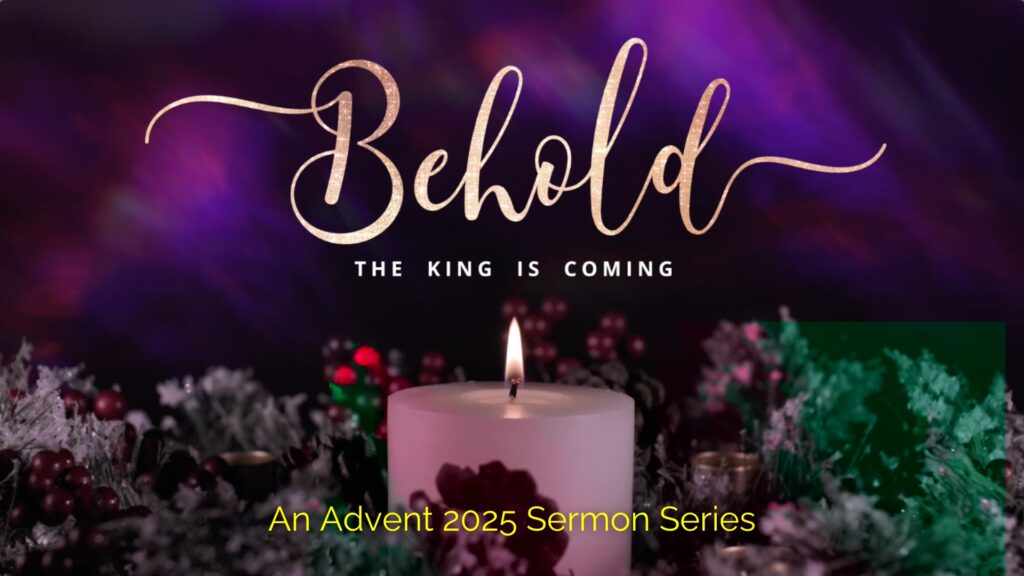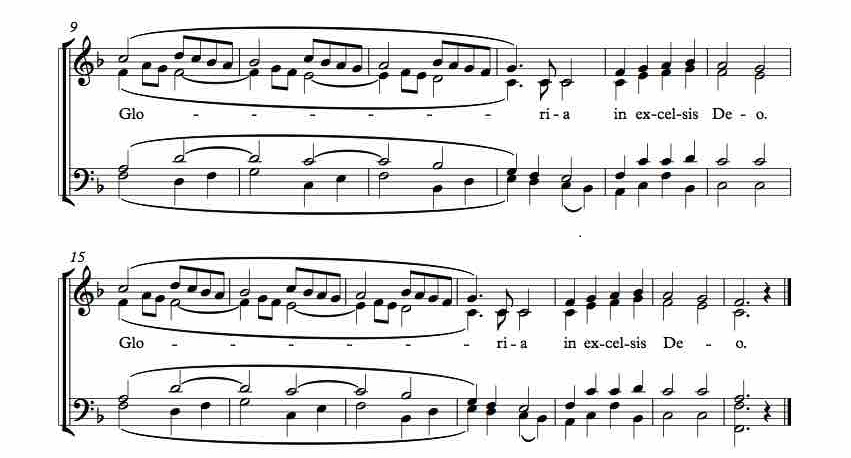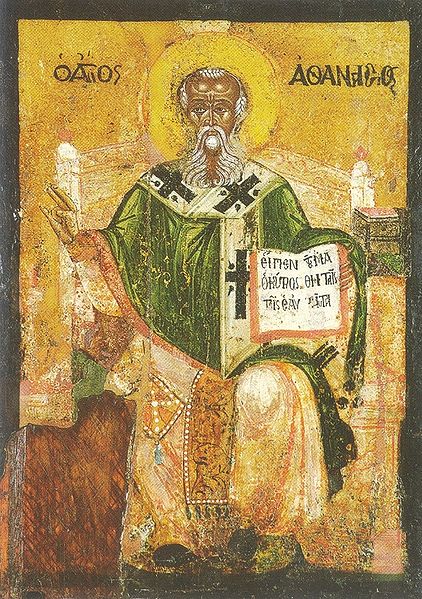
DECEMBER 2025 PASTOR’S CORNER — ADVENT: THE KING IS COMING

And Mary said, “My soul magnifies the Lord,
and my spirit rejoices in God my Savior,
for he has looked on the humble estate of his servant.” — Luke 1:46-48
There’s a tension lurking underneath the surface of our celebrations of Christmas each year. It’s one of those things that can be easy to overlook, but once you see it, it’s really hard to unsee it. In the birth of our Savior, Jesus Christ, we celebrate the fulfillment of all of the prophecies in the Bible that speak to the redemption of all of humanity and creation. Over the course of this month, we will sing of joy, while many are filled with sorrow and struggle with depression. We sing of peace, while wars rage around the world and in our hearts. We sing of love, and yet are surrounded by so much hate. We sing of hope, but wonder, deep down, if anything will ever change. Wasn’t Jesus supposed to change all of this?
Consider Mary’s song of joy of what God has already done in The Magnificat: “He has shown strength with his arm; he has scattered the proud in the thoughts of their hearts; he has brought down the mighty from their thrones and exalted those of humble estate; he has filled the hungry with good things, and the rich he has sent away empty.” (Luke 1:51-53) I look around the world today, and I see a lot of proud and mighty people still boasting. I see those of humble estate still struggling. The hungry are still starving; the rich are still hoarding. We know Jesus accomplished these things, because the Bible is very clear that He did, but why is there still so much suffering and injustice, sin and brokenness? It is the season of Advent that helps provide an answer.
In her magnificent book, Advent: The Once & Future Coming of Jesus Christ, Fleming Rutledge writes,
Karl Barth exclaimed, “What other time or season can or will the Church ever have but that of Advent!” This illuminates the present dimension of the season. It locates us correctly with relation to the first and second comings of Christ. Advent calls for a life lived on the edge, so to speak, all the time, shaped by the cross not only on Good Friday but wherever and whenever we are, proclaiming his death to be the turn of the ages “until he comes” (I Cor. 11:26)… In a very real sense, the Christian community lives in Advent all the time. It can well be called the Time Between, because the people of God live in the time between the first coming of Christ, incognito in the stable in Bethlehem, and his second coming, in glory, to judge the living and the dead. In the Time Between, “our lives are hidden with Christ in God; when Christ who is our life appears, then we also will appear with him in glory” (Col. 3:3–4). Advent contains within itself the crucial balance of the now and the not-yet that our faith requires. (Pg 7)
Everything the Bible says about what Jesus accomplished in His incarnation is absolutely true. God is now with us in Jesus Christ. The power of sin and death has been broken. The proud have been brought down and the humble lifted up. Prisoners freed. The blind given sight. The lost found. The broken soul made whole. And yet. And yet, all of these things are also yet to be completed. As Jesus said, “The time is fulfilled, and the kingdom of God is at hand; repent and believe in the gospel.” (Mark 1:15) Jesus has absolutely accomplished all of these things, but He has not yet completed all of these things. Advent is the season that reminds us of this tension and invites us into it. It is the season of, as Rutledge said, “the Time Between.”
When Jesus returns, the Kingdom of God will finally be consummated. The work begun with His first coming will be completed. That which has happened now in part will then be completed in full. It is the season of Advent that keeps our focus and our hope on that great and wonderful day. Advent doesn’t merely acknowledge the tension of the already/not yet, it embraces it. Just as in the incarnation our Savior came to earth and met us where we are, the season of Advent reminds us that He is still doing the same today, and that one day He will finish what He started.
This Advent, we’ll take a look at how each of the Gospels tell the story of the birth of our Savior (except for Mark, who doesn’t include a birth narrative), and how each points us to His return. We’ll begin our Advent celebration with a service of prayer, scripture and song, using Mary’s Magnificat as our guide to prepare our hearts and our souls to worship deeply and well this holiday season. As you prepare for and celebrate the birth of our Savior, keep your eyes focused on His return. Joy to the world, the King is coming!
For we know in part and we prophesy in part, but when the perfect comes, the partial will pass away. When I was a child, I spoke like a child, I thought like a child, I reasoned like a child. When I became a man, I gave up childish ways. For now we see in a mirror dimly, but then face to face. Now I know in part; then I shall know fully, even as I have been fully known. (1 Cor. 13:9-12)
Blessings,
Rev. David Garrison
Read more...

DECEMBER 2025 MILLS’ MUSINGS – GLORIA IN EXCELSIS DEO

For as long as I can remember, I have loved the music of the Christmas season. From Linus and Lucy Can Rock to You’re a Mean One, Mr. Grinch and from Frosty the Snowman to Rudolph, the Red-Nosed Reindeer, music from the animated specials of my childhood still brings a smile to my face.
Through the years, I have added an appreciation of more substantial works, including Antonio Vivaldi’s Gloria and George Friedrich Handel’s Messiah. Although they were written about 300 years ago, both are still widely performed when Christmas time is here, eloquent evidence of music’s ability to convey profound truths to human souls.
And I never tire of playing or singing Christmas carols. My favorite is Angels We Have Heard on High. The melody comes from a traditional French piece, “The Angels in Our Countryside.” “Traditional” is one way musicians say, “We have no idea who wrote this tune.”
The author of the 10 original verses is equally unknown. We do know that in 1860, these verses were translated into English by James Chadwick, a Roman Catholic bishop from England. I was surprised when I learned that it was not until 1966, when the American composer Austin Lovelace was preparing to include it in a new United Methodist hymnal, that this centuries-old carol was first given the title “Angels We Have Heard on High.”
One of my earliest musical memories is learning to sing this carol for my home church’s Christmas pageant. This annual event was the standard small church bathrobe drama, complete with shepherds and angels, wise men and a plastic baby Jesus. But with each tableau, the Junior Choir sang a verse or two from an appropriate carol. When we got to Angels We Have Heard on High, I was asked to sing the alto line for the refrain.
That was a revelation.
As the carol’s refrain began, the sopranos held their note for several beats while the altos sang shorter notes below them. Then we held a long tone while the sopranos kept changing notes above us. I was hooked. It would be years before I learned that the technical term for that musical procedure is “polyphony,” literally, “many voices.” It took me even longer to recognize that this compositional technique provides an ideal way to set the text of the carol’s refrain, which is taken from Luke 2:13-14:
And suddenly there was with the angel a multitude of the heavenly host praising God and saying,
“Glory to God in the highest,
and on earth peace among those with whom he is pleased!”
By definition, a multitude of angels would include many voices. Using what a former pastor called my “sanctified imagination,” I can imagine that the voices of the heavenly host ranged from low to high, each with its own distinctive timbre. And while I can’t imagine what that heavenly choir sounded like when they praised God from the sky, I’m sure that what the shepherds heard was glorious and that it glorified God in the highest.
As together we begin this new Christian year, journeying through Advent to Christmas with the music of the season ringing in our years, let me encourage you to listen a bit more carefully to the carols you’ll hear and sing. For even though we know them all by heart, if we pay a little more attention to both the words and the music, we just may find our souls refreshed in unexpected ways.
Gloria in excelsis Deo.
Read more...

November 2025 MILLS’ MUSINGS – FOR ALL THE SAINTS

On Sunday, November 2, Northminster will add an extra element to our usual order of worship – a necrology. Names of church members who have died in the past 12 months will be read aloud and followed by a single chime. It’s a simple but meaningful ritual, a practice that reminds us of two important truths about our faith. But first, a bit of history.
In the Roman Catholic Church, All Saints Day is annually celebrated on November 1st, while All Souls Day is November 2nd. In many Protestant denominations, the first Sunday in November unites these celebrations on what we call All Saints Sunday.
While there are understandable differences between Catholic and Protestant traditions, a central theme in each is celebrating the transition of believers from the Church Militant to the Church Triumphant, that is, recognizing and rejoicing with all those Christians who have finished their work on earth and now abide with God in heaven.
The first truth this celebration brings to our attention is that all Christians are saints. Both the Hebrew (OT) and Greek (NT) words translated “saint” come from a root that means “holy.” To be holy is to be set apart by God in order to serve God. Paul describes saints as “those sanctified in Christ Jesus, called to be saints together with all those who in every place call upon the name of our Lord Jesus Christ, both their Lord and ours” (1 Cor. 1:2).
Here Paul shows us that sainthood, which is also called sanctification, (being made holy), is both a position and a process. As God’s chosen people, we have been made holy through the work of Jesus Christ on the cross. We are being made holy through our cooperation with the work of the Holy Spirit in and through us. And one day we will be made holy as we reunite with the saints who reached heaven before us.
As in our worship on All Saints Sunday we remember the saints of this congregation who now worship God in heaven, we are also reminded of a second truth – that our Christian faith is built on a firm historical foundation.
I affirm the observation made by church historian Bruce Shelley, who writes: “Many Christians today suffer from historical amnesia. The time between the apostles and their own day is one giant blank. That is hardly what God had in mind.”[1]
I suspect not many of us could cite chapter and verse of the history of Northminster Evangelical Presbyterian Church. I’m quite sure vast numbers of Presbyterians have little knowledge about the ecclesiastical developments that followed Martin Luther’s 95 Theses. Even more know less about the first 1,500 years of Christian history and theology. Such knowledge gaps impede our growth as individual Christians and as a congregation. For if we don’t know how we got to where we are, where we go next is anybody’s guess.
This All Saints Sunday, let’s rejoice with the souls we have known who now rest from their labors. And in the year between this celebration and the next, let’s spend some time looking back so that we might more clearly see the way ahead.
Read more...

November 2025 Pastor’s Corner — DoorDashing Our Faith

“Hear this word, you cows of Bashan,
who are on the mountain of Samaria,
who oppress the poor, who crush the needy,
who say to your husbands, ‘Bring, that we may drink!’” — Amos 4:1
This morning I read an article in The Atlantic, “The Innovation That’s Killing Restaurant Culture.” From the article: “In 2024, nearly three out of every four restaurant orders were not eaten in a restaurant, according to data provided to me by the National Restaurant Association, a trade group. The share of customers using delivery specifically, as opposed to picking up takeout or going to a drive-through, more than doubled from 2019 to 2024. In a recently released poll by the association, 41 percent of respondents said that delivery was ‘an essential part of their lifestyle.’”
It’s difficult to understate the impact this is having on the restaurant industry. Restaurants are adapting their menus to be more cost effective and provide food that travels better. Kitchens are getting bigger, seating areas smaller. Some new restaurants aren’t designed for in-person dining at all. Ellie Cushing writes, “In effect, delivery has reversed the flow of eaters to food, and remade a shared experience into a much more individual one. If communities used to clench like a fist around their restaurants, now they look more like an open palm, fingers stretched out as far as possible, or at least to the edge of the delivery radius.”
It’s too easy to blame this shift on the pandemic, although the pandemic certainly accelerated it, as it did many other things. Like so much else, these shifts started long before a virus shut us all up inside our homes. The seismic shift happened back in the early 2000s with the dual supernovas of the development of the internet and smartphones. Twenty or so years later, every facet of our lives has radically changed. Winston Churchill once said, “We shape our buildings and afterward our buildings shape us.” We now have the ability to sit at home and have the world brought to us on a whim, but at what cost? How is that convenience shaping us?
The “cows of Bashan” were the ancient equivalent of Wagyu beef today. They were meticulously doted over and cared for so as to provide the absolute highest quality meat possible. When Amos calls the Israelites the cows of Bashan, he is saying they are lazy, fat, and indolent. As Michael McKelvey writes, Amos is painting a picture of a people who “defiantly and selfishly take advantage of others, using them for their own ends. Their concern is not for what is morally right or socially acceptable. Instead, they live unto themselves; their god is their belly.” Feeding their desires and appetites by any means necessary, they cared not at all about the consequences of their self indulgence. One might argue whether we are more or less self-indulgent than the ancient Israelites, but one thing is true: we have not counted the cost we are paying for our cultural smartphone addiction. It’s been 2,800 years since Amos wrote his prophecy, but it has come true in far more visceral ways than he ever imagined.
What makes dining at a restaurant special isn’t simply that someone else is cooking for you. It’s the entire experience. It’s the sensory experience of the aromas and the ambiance, but more than that it’s the relational experience — from the welcome extended by the host, to the courtesy of the waitress, to the attention given to your meal by the chef, to the shared fellowship of those with whom you dine. None of that can be put in a box and delivered to your door. What is lost without those experiences goes far beyond the scope of these words. This barely scratches the surface; we haven’t talked about the impact on families, jobs, the economy, and much more.
However, Amos wasn’t talking about having food delivered to your door, and neither are we. Have we taken the time to consider what we are losing by doordashing our worship, our discipleship, or our fellowship? We worship by turning on the radio or Spotify. We get our discipleship from TikTok. We find fellowship through social media. All from the comfort of our couches. But true faith is inescapably relational and experiential. True worship happens when we are gathered together with the saints (Hebrews 10:25). Discipleship occurs when “iron sharpens iron” (Prov. 27:17). Fellowship, which at its root means “connection,” requires being physically present with one another (Acts 2:42). Modern technology is reshaping everything, but it can’t change the fundamental paths of our faith.
There’s nothing necessarily wrong with doordashing your dinner when you need to, or using Spotify or TikTok. But be aware of what you are choosing when you do so, and what you are not choosing as well. Be intentional in being wise and discerning when it comes to your worship, discipleship and fellowship. Make the effort to pursue Jesus in the company of other brothers and sisters. In person. Much like dining out, our faith was never meant to be an individual experience, but a communal one.
Finally, brothers and sisters, whatever is true, whatever is honorable, whatever is just, whatever is pure, whatever is lovely, whatever is commendable, if there is any excellence, if there is anything worthy of praise, think about these things. What you have learned and received and heard and seen in me—practice these things, and the God of peace will be with you. — Philippians 4:8-9
Blessings,
Rev. David Garrison
Read more...

MILLS’ MUSINGS – YOU’RE GONNA NEED A BIGGER CAKE

This year the Nicene Creed celebrates its 1,700th birthday. Accommodating that many candles would require a birthday cake far larger than any I’ve ever seen. And if you’re wondering about this article’s title, you may want to rewatch Jaws, which turns 50 this year. (Anybody else feeling old?)
The Nicene Creed seems less well known to Presbyterians and other Reformed Christians than either the Apostles’ Creed or the Westminster Confession of Faith. For reasons I won’t explore here, I don’t find that surprising. But I do believe that as the Church enters its third millennium, all Christians would be well served by learning more about the background and importance of this creed as it reaches the ripe old age of 1,700.
In the year 325, the Church was still adjusting to its new status in the Roman Empire. Barely a decade earlier, the new Roman Emperor, Constantine, had converted to Christianity and issued his Edict of Toleration, which legalized the faith in the empire. The Edict would prove a mixed blessing. Official persecution of Christians ended and Church membership grew rapidly. Unfortunately, with growth came controversy.
As early as 318, a pastor named Arius began teaching that Jesus was not fully God; that Jesus was not eternal, but instead was the first creature made by God. This new doctrine contradicted Scripture and three centuries of Church teaching. To resolve the conflict in the Church, and not coincidentally to help keep peace in his empire, Constantine called for a council of church leaders to meet in city of Nicaea in 325.
There, Arius was given the opportunity to explain his beliefs to the bishops. He and his supporters were sure his views would prevail. However, his novel teaching, summarized by the slogan “There was when the Son was not,” was opposed by one of the most able and influential theologians of the Early Church, Athanasius. Athanasius insisted that if Jesus wasn’t fully God, he couldn’t fully accomplish human salvation. “That which has not been assumed has not been healed,” was his succinct response.
Rejecting as heretical Arius’ insistence that Jesus was not God, the Council of Nicaea produced the Nicene Creed, which declared that Jesus is “of one substance” (homoousia) with the Father. Homoousia combines homo, meaning same, with ousia, meaning substance, or essence. The Greek word isn’t found in the Bible, which troubled some members of the council. But as the Church worked to articulate the Bible’s unchanging revelation in the language of its day, homoousia seemed the best word to express the eternal relationship between God the Father and God the Son.
The importance of the Nicene Creed in Christian history is summarized by the late Presbyterian theologian John Leith who writes, “The first Christian doctrine that the church settled in an ecumenical council and that has subsequently received approval in the life of the church through the centuries had to do with the deity of Jesus Christ. The church made clear at Nicaea what it was convinced had always been the faith of Christian people. In Jesus Christ human beings are confronted by God.”
For nearly two millennia, the Nicene Creed has remained the most widely quoted creed in Christendom. It’s accepted by Roman Catholics, Eastern Orthodox, Anglicans, and most Protestant denominations. Each time we recite this historic affirmation of our faith, we remind ourselves of a fundamental Christian truth: God’s nature is Triune. We also remind ourselves of our unbreakable connection to Christians around the world and throughout time.
So, on the 1,700th birthday of the Nicene Creed, a cake may be in order. Especially if we fudge the candles.
Read more...

August 2025 Pastor’s Corner — Echoes of Eden

I’m not lost
I’m just looking for what I haven’t found
there’s an ache inside of me that’s reaching out
for something deeper than anything I’m seeing
like a traveler I’m following
the echo of Eden.
— Green River Ordinance, “Echo of Eden” (video below)
Many years ago my grandfather and I boarded a plane to a place I’d never before been. When I stepped off the walkway into Ted Stevens International Airport in Anchorage, Alaska, the very first thought that crossed my mind was, “I’m home,” which was strange because airports aren’t the homeliest of places and, again, I’d never been there before. It would be another decade before I was actually able to call Anchorage “home,” and that only lasted for two years.
For most of my life, “home” for me meant Rockville, Maryland. It’s where I grew up and where my parents lived for 40 years. I left Rockville in 1997 and my parents moved to North Carolina a few years ago. But even before my parents moved away, Rockville stopped being home. I would go back to visit, but it wasn’t a place I referred to as “home” any longer. Even though I call places in Orlando, Anchorage, St. Louis, Hendersonville and now Madison Heights “home,” the longing for home points to something deeper.
A few months ago I was with a group of friends and family, and we had the most heartwarming and delightful time together. It was an evening of silliness and joy, one of those moments in time that you wish would last forever, but of course never do. Those moments touch a longing in our soul to be in the company of others, a longing that is at times met in our relationship with our spouse, our children, life-long close friends, maybe extended family. But as good as those relationships are, they aren’t perfect and often bring as much pain as they do joy. We weren’t meant to be alone, God says in Genesis 2, but relationships are hard. Sometimes too hard. We long for deep, meaningful relationships with others, but because it’s often so hard and painful, we settle for something much less, like the shallow façade of social media.
It seems as if our lives are becoming ever more frenetic and chaotic; we feel stretched in a dozen different directions at once. We frantically try to keep all of the plates spinning, while they begin to slow and wobble precariously. The more we stretch, the harder we press, the more the cracks begin to show. 2 Corinthians 4:7 describes us as cracked “jars of clay,” through which the grace of God shines… but if there are more cracks than clay, can it still be called a jar? As Chuck DeGroat writes, “We all think we know the solution — more downtime, more relaxation, more rest. And we’re all wrong.” What we truly long for is wholeheartedness.
All of this points to a persistent gnawing discontent in our souls, a longing that we try to satisfy in a thousand different ways but is always unsatisfied. We know there’s something missing, but we often aren’t sure what. Augustine once said, “our hearts are restless until they find their rest in You.” The most foundational longing of the human heart is for God. If earth has no sorrows heaven can’t heal, then neither does earth have any means of satisfying a longing that yearns for something beyond this world.
CS Lewis once wrote, “If I find in myself a desire which no experience in this world can satisfy, the most probable explanation is that I was made for another world.” Our longing for home, for relationship, for wholeheartedness, for God can never be satisfied by anything in this world, because they are longings that have existed long before this world. They are longings for “the way things used to be” in the truest, oldest sense of that phrase. They are echoes of Eden, longing for the way things were before The Fall. Eugene Peterson says, “This place, this garden, is not utopia, is not an ideal no-place. It is simply place, locale, geography, geology. But it is also a good place, Eden, because it provides the form by which we can live to the glory of God”
These longings have echoed for millennia, and they are only satisfied in Jesus Christ. Through our salvation in Christ, we are able to experience a partial satisfaction of those longings, but their ultimate satisfaction comes in the consummation of the Kingdom of God when Christ returns. Our August sermon series looks at the “echoes of Eden,” these deep longings of the human heart. We’ll see how they are born out of the goodness of God’s creation, how Christ has redeemed them, and how they will ultimately be satisfied in the New Heavens and New Earth when Jesus consummates His kingdom at the end of time. Be sure to join us for worship in person or online during August.
And not only the creation, but we ourselves, who have the firstfruits of the Spirit, groan inwardly as we wait eagerly for adoption as sons, the redemption of our bodies. For in this hope we were saved. Now hope that is seen is not hope. For who hopes for what he sees? But if we hope for what we do not see, we wait for it with patience. — Romans 8:23-25
Blessings,
Read more...

July 2025 Pastor’s Corner — Joy in the Mess

Happiness is a firecracker sitting on my headboard
Happiness was never mine to hold
Careful child, light the fuse and get away
‘Cause happiness throws a shower of sparks
— The Fray, “Happiness”
I think this is because we’ve confused and conflated happiness and joy. Happiness is a fleeting emotional experience. Joy is a deeper state of being. We pursue happiness because it’s an easier objective, something that seems like it’s more within our control. But what we are actually yearning for is joy. Joy is one of the fruit of the Spirit (Galatians 5:22). While it certainly has an emotional component, joy is something that persists no matter our circumstances. No matter how messy life gets, joy persists in our hearts and our souls. It doesn’t ignore the sad, the bad, the hurtful, the wrongs of life but recognizes that there’s more to this life and to our faith than what is happening in this moment or season.
This summer we’re working our way through the book of Philippians. It’s a letter written to encourage a group of Christians to find joy in the midst of the messiness of their lives and their circumstances. It was written by a guy who was in a pretty messy place in his life at the time himself. And yet, the resounding theme is rejoice, rejoice, rejoice.
Not a “pretend the messiness doesn’t exist” naïve joy, but a joy that is grounded in something deeper than our life circumstances. A joy grounded in our salvation in Jesus Christ. A joy that knows there is nothing we will go through or endure that our Savior did not endure Himself. A joy that knows that there is no greater joy than to know and be known by Christ as deeply and thoroughly as possible.
Happiness says that it will come when the mess gets cleaned up. Joy comes in the midst of the mess. As we said above, joy is a fruit of the Spirit. As we pursue Jesus Christ, the seeds of joy are planted in our soul. As we grow in grace and truth, faith grows those seeds so that even in the messiness, when life goes sideways, through the hurt and pain, a joy invincible is nurtured and developed. This kind of joy doesn’t appear magically overnight, but rather through a lifetime of faithful trust in Jesus Christ.
There’s nothing wrong with being happy, as long as we recognize that happiness isn’t an end unto itself. Happiness understood rightly should be an expression of the joy we have in our salvation. May God nurture a joy in your soul that surpasses understanding, a joy born of gratitude for our salvation in Jesus Christ and the fruit of the work of the Holy Spirit in our hearts and souls.
Rejoice in the Lord always; again I will say, rejoice. Let your reasonableness be known to everyone. The Lord is at hand; do not be anxious about anything, but in everything by prayer and supplication with thanksgiving let your requests be made known to God. And the peace of God, which surpasses all understanding, will guard your hearts and your minds in Christ Jesus. — Phil. 4:4-7
Blessings,
Rev. David Garrison
Read more...

June 2025 Mills’ Musings — Rivers Of Living Waters

Quick, what’s the first image that comes to mind when you read the words “Holy Spirit?”
A dove? Tongues of fire? A mighty wind?
Did anyone choose “rivers of living water?” Me either.
Although the connections between the outpouring of God’s Holy Spirit and rivers of living waters probably aren’t top of mind for any of us, they are linked in three easily overlooked verses from the seventh chapter of John’s Gospel:
37 On the last day of the feast, the great day, Jesus stood up and cried out, “If anyone thirsts, let him come to me and drink. 38 Whoever believes in me, as the Scripture has said, ‘Out of his heart will flow rivers of living water.’” 39 Now this he said about the Spirit, whom those who believed in him were to receive, for as yet the Spirit had not been given, because Jesus was not yet glorified. (John 7:37-39, ESV)
The feast, as we learn at the outset of John 7, is the Feast of Booths or Tabernacles (in Hebrew, Sukkot). The seven-day feast, celebrated in the Fall, was a time both to remember God’s past provision for Israel in the wilderness and to praise God for the harvest that had just been gathered. Since late autumn usually brought a drought, this festival also was a time of corporate prayer that God would refresh the land and refill the cisterns by sending once again his life giving rain.
This context helps us understand why a water bearing ceremony was central to Sukkot. Each day of the feast, priests would use a golden pitcher to draw water from Jerusalem’s Pool of Siloam. They would then bring the water to the Temple where it would be mixed with wine and poured out on the altar as a drink offering. This ceremony was accompanied by joyful music, dancing, and huge public celebrations, a fulfillment of Isaiah 12:3, “With joy you will draw water from the wells of salvation.”.
Earlier in John’s gospel, Jesus had told the Samaritan woman at the well, “Everyone who drinks of this [well] water will be thirsty again, 14 but whoever drinks of the water that I will give him will never be thirsty again. The water that I will give him will become in him a spring of water welling up to eternal life” (John 4:13-14). Now, at the Feast of Booths, he plainly tells his disciples that the living water he had promised was the gift of the Holy Spirit.
In these few words, spoken on the last day of the feast, Jesus laid a foundation that later would help his disciples understand the Holy Spirit’s connection to his own person and work. In the moment, Jesus’ first disciples couldn’t fully grasp the meaning of his words. But once he was “glorified,” John’s term for Jesus’ crucifixion and resurrection, the Spirit would be poured out in all his fullness. That outpouring wouldn’t end with the disciples in Jerusalem on the first Christian Pentecost. Those disciples would themselves become conduits through whom rivers of living water would continue to flow.
Today, you and I are Jesus’ disciples. One of our responsibilities is to continue to let the presence and the power, the goodness and the blessings, of God’s Holy Spirit flow through us and thereby nurture and nourish a dry and weary land.
Quick, what’s the first image that comes to you mind when you read the words “Holy Spirit?”
Read more...

May 2025 Pastor’s Corner — All It Takes Is An Invitation

How then will they call on him in whom they have not believed? And how are they to believe in him of whom they have never heard? And how are they to hear without someone preaching? And how are they to preach unless they are sent? As it is written, “How beautiful are the feet of those who preach the good news!” — Romans 10:14-15
Last Wednesday we held an “Inquirer’s Class.” This is the class we offer to new visitors and regular attenders who would like to learn more about Northminster, our denomination (the Evangelical Presbyterian Church), and where we believe God is leading us in the future. While the class is open to anyone who would like to attend, we extended specific invitations to 11 folks who have been visiting and worshipping with us regularly since last fall. Of those 11, 6 were able to attend (those missing were family members who had conflicts). It was a fun evening with a lot of great conversation.
We began the evening by asking for folks to share what brought them to Northminster. Four of the six had variations of the same answer: someone invited them. Here’s the thing: whittle every evangelism and church growth strategy down and ultimately they all are about the same thing: inviting someone to church. The best tool we have, and really the only one that matters, is relationships. Every story I’ve ever heard about how someone came to faith in Jesus Christ boils down to someone in their life caring enough to tell them about Jesus.
This is exactly how God intended it to be. The Gospel spreads primarily and almost exclusively through word-of-mouth. At the very beginning of Jesus’ ministry, the reason Nathanael ended up as a disciple was because Philip invited him to “come and see” for himself. (John 1:46) Jesus repeatedly told His disciples and those He healed to tell others about Him (Matthew 28:19-20; Mark 16:15; John 20:21; Mark 5:19; Matthew 10:7). After Jesus was resurrected and ascended into heaven, the apostles were so amazed and transformed by all they had seen and experienced but when told to stop talking about it, they responded, “we cannot but speak of what we have seen and heard.” (Acts 4:20).
That’s also exactly the way God intended it to be. As we grow as disciples and are transformed into the likeness of Jesus Christ by the Holy Spirit, that change should be something of which we cannot but speak. That’s what a “testimony” is — telling others about what you have seen and heard, about how Jesus has changed and blessed your life. What have you seen and heard from Jesus lately? How has He transformed you and changed you? Maybe you’ve experienced a miraculous physical healing, or He has healed your heart or soul. Maybe you’ve learned something new about the depths of His grace or the wonders of His creation. Whatever it is, tell someone about it, and invite them to experience the same transformation you’ve seen. You don’t need to give a sermon or a thorough theological discourse, all you need to do is “Go home to your friends and tell them how much the Lord has done for you, and how he has had mercy on you.” (Mark 5:19).
Maybe you don’t know what to say to someone about Jesus, or the thought of it makes you too nervous. Then let your actions tell the story of how Jesus is changing you. Jesus says in Matthew 5:16, “...let your light shine before others, so that they may see your good works and give glory to your Father in heaven” and in John 13:34-35, “A new commandment I give to you, that you love one another: just as I have loved you, you also are to love one another. By this all people will know that you are my disciples, if you have love for one another.” When we live lives consistent with the Gospel and the Kingdom of God, people around us won’t be able to help but notice, and when they ask you why you’re so weird, follow Philip’s example and invite them to come to church and see for themselves. If we’re doing things right, the Gospel is proclaimed at some point in every worship service. You might not be comfortable telling someone about Jesus, so let us do it for you.
The Holy Spirit will bring to salvation all those whom God has chosen, it might just be that the means by which he does that is the invitation you extend to someone. Take a few minutes to think of two or three people in your life who don’t already know Jesus Christ as their Lord and Savior. Add them to your daily prayer list, that the Lord would begin softening their heart to hear the Gospel and that He would provide an opportunity for you to invite them to come with you to meet Jesus, whether that’s through a conversation you have with them or by bringing them to church with you. All it takes is an invitation.
“Go therefore and make disciples of all nations, baptizing them in the name of the Father and of the Son and of the Holy Spirit, teaching them to observe all that I have commanded you. And behold, I am with you always, to the end of the age.” — Matthew 28:19-20
Blessings,
Rev. David Garrison
Read more...

April 2025 Mills’ Musings — Waking Up on Mars

“The odds of that happening are 0. It’s just not possible. It would violate the laws of nature.”
That was the answer given by a person in a space travel video I watched recently. He had been asked to estimate the odds that he would wake up the next morning on Mars. Since, at least as I write this, no human being has yet set foot on Mars, let alone slept there, and since no known human technology can transport someone between planets overnight, his response seems perfectly reasonable.
But is it accurate? Most of us, I suspect, would say it is. But some would disagree.
Chief among the naysayers would be those who embrace and promote a field of study known as quantum mechanics. A fundamental dogma of quantum theory is that no one can ever say with absolute certainty that something can or can’t happen. That’s because, in their worldview, uncertainty is built into the subatomic fabric of the universe.
In practical terms, that means we can never say never. We can only speak in terms of likelihood and probabilities. Confined within the canon of quantum physics, the most emphatic statement we could make is that waking up on Mars tomorrow morning would be a low-probability event.
Of course, if that were true the same could and indeed must be said about Jesus’ resurrection.
For the better part of the last 2,000 years, standard arguments used to deny the reality of Jesus’ resurrection have included claims that no one has seen someone come back to life after he has died and been buried; that the resurrection of the body would violate that laws of nature; and that, therefore, Jesus’ resurrection never could have happened.
Wrong, wrong, and wrong – at least according to the best thinking cutting edge of today’s science has on offer. While I would find it fun to watch atheistic physicists become enmeshed in the web they have spun, that possibility raises a red flag for Christians: We should never succumb to the temptation of using any science – past, present, or future – to validate any article of our Christian faith. Galileo helps us remember why.
Galileo’s story actually began around 150 A.D., when Ptolemy taught that the earth was an immovable mass located at the center of the universe and that all celestial bodies, including the planets of our solar system, revolved around it. In the following millennium, Ptolemy’s scientific theory became Roman Catholic Church doctrine.
In 1530, Copernicus published On the Revolutions of the Heavenly Spheres, which proposed replacing Ptolemy’s geocentric model with one in which the planets orbited a central sun. A century later, Galileo wrote Dialogue Concerning the Two Chief Systems of the World – Ptolemaic and Copernican, in which he sided with Copernicus and, for his troubles, was convicted of heresy. Three hundred years after that, Pope John Paul II announced that the Inquisition’s decision concerning Galileo was mistaken.
Science is a wonderful gift from God to his human creation. I’m grateful for things like electricity and antibiotics. I’m intrigued by the possibility of traveling to Mars. But God’s people need to keep in mind that truth isn’t true because science says it’s so. Scientific “truth” is constantly changing. “Jesus Christ is the same yesterday and today and forever. Do not be led away by diverse and strange teachings” (Heb. 13:8-9).
I doubt I’ll get to see the first human footprint on Mars. But I do not doubt the day will come when I will be seated at a banquet table in heaven. My certainty about heaven doesn’t rest on what science says. Rather my assurance is rooted in the reality that the Lord is risen. He is risen indeed.
Read more...
